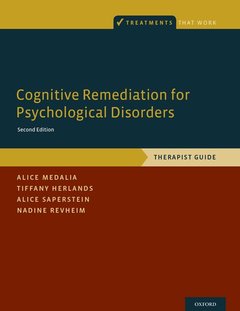Description
Cognitive Remediation for Psychological Disorders (2nd Ed.)
Therapist Guide
Treatments That Work Series
Authors: Medalia Alice, Herlands Tiffany, Saperstein Alice, Revheim Nadine
Language: English
Subjects for Cognitive Remediation for Psychological Disorders:
56.70 €
In Print (Delivery period: 21 days).
Add to cart
Publication date: 12-2017
240 p. · 18.1x25.3 cm · Paperback
240 p. · 18.1x25.3 cm · Paperback
Description
/li>Biography
/li>
Individuals with serious and persistent mental illnesses, including schizophrenia and affective disorders, often experience cognitive deficits that make it challenging to perform everyday tasks. For example, they may have difficulty paying attention, remembering and learning, thinking quickly, and solving problems, and this may interfere with functioning at work, school, and in social and living situations. Cognitive remediation is an evidence-based behavioral treatment for people who are experiencing cognitive impairments that interfere with role functioning. Cognitive Remediation for Psychological Disorders contains all the information therapists need to set up a cognitive remediation program that helps clients strengthen the cognitive skills necessary for everyday functioning. The program described is called Neuropsychological and Educational Approach to Remediation (NEAR), an evidence-based approach that utilizes carefully crafted instructional techniques which promote learning. The goals of NEAR are to provide a positive learning experience and to promote independent learning and optimal cognitive functioning in daily life. The second edition of this popular Therapist Guide provides step-by-step instructions on how to implement NEAR techniques with patients. Guidelines for setting up and running a successful cognitive remediation program are laid out in an easy-to-follow format. Therapists will learn how to choose appropriate cognitive exercises, recruit and work with clients, perform intakes, and create treatment plans. This Guide comes complete with all the tools necessary for facilitating treatment, including program evaluation forms and client handouts.
Alice Medalia, PhD, is Professor of Medical Psychology and Director of Psychiatric Rehabilitation at Columbia University Medical Center, College of Physicians and Surgeons. She is also the Clinical Director of Cognitive Health Services for the New York State Office of Mental Health, where she oversees the dissemination of treatments to improve cognition in the largest state mental health system in the United States. Dr. Medalia brought the concept of Cognitive Health to the field of Psychiatry and has received numerous awards in recognition of her leadership in the field. Tiffany Herlands, PsyD, is Assistant Professor of Medical Psychology at Columbia University Medical Center, College of Physicians and Surgeons, and Clinical Director of the Lieber Recovery and Rehabilitation Clinic at Columbia Doctors Midtown. Dr. Herlands has been running Learning Centers since her Kessel Fellowship with Dr. Alice Medalia, and she is a frequent speaker on the topic of treating cognitive disorders. She trains interested professionals in the design and operation of cognitive remediation programs. Alice Saperstein, PhD, is Assistant Professor of Medical Psychology at Columbia University Medical Center, College of Physicians and Surgeons. Dr. Saperstein received training in NEAR during her Kessel Fellowship with Dr. Alice Medalia, and has been involved in the empirical study and implementation of personalized cognitive remediation approaches in a variety of clinical settings. Dr. Saperstein is involved in promoting the dissemination of new research on cognitive remediation approaches and mechanisms of treatment outcome. Nadine Revheim, PhD, is a Program Director/Psychologist for a hospital-based life skills enhancement program focusing on evidence-based treatment for individuals for schizophrenia. Dr. Revheim has over 35 years of experience working with the seriously mentally ill as a research scientist, psychologist and occupational therapist. She received training in NEAR during he
© 2024 LAVOISIER S.A.S.




